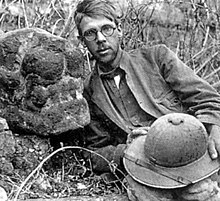
Back سيلفانوس مورلي Arabic سيلفانوس مورلى ARZ سیلوانس مورلی AZB Sylvanus Morley Danish Sylvanus Morley German Sylvanus Morley Esperanto Sylvanus Morley Spanish Sylvanus Morley Finnish Sylvanus Morley French Sylvanus Morley Italian
This article includes a list of general references, but it lacks sufficient corresponding inline citations. (August 2019) |
Sylvanus Griswold Morley | |
|---|---|
 | |
| Born | June 7, 1883 |
| Died | September 2, 1948 (aged 65) |
| Nationality | American |
| Alma mater | • Pennsylvania Military College (1904, civ. eng.) • Harvard (1907 AB; 1908 MA) |
| Known for | •Maya region archaeology and directorship of Carnegie programs • research on Maya calendar and inscriptions • "Old Empire" theory of Classic-era Maya polities • excavations at Chichen Itza • popular writings in archaeology • World War I espionage |
| Scientific career | |
| Fields | Archaeology and epigraphy |
| Institutions | • School of American Archaeology (1907–13) • Carnegie Institution of Washington (1913–40) • School of American Research and Museum of New Mexico (1946–48, director) |
Sylvanus Griswold Morley (June 7, 1883 – September 2, 1948) was an American archaeologist and epigrapher who studied the pre-Columbian Maya civilization in the early 20th century. Morley led extensive excavations of the Maya site of Chichen Itza on behalf of the Carnegie Institution and published several large compilations and treatises on Maya hieroglyphic writing. He also wrote popular accounts on the Maya for a general audience.
To his contemporaries, "Vay" Morley[1] was one of the leading Mesoamerican archaeologists of his day. Although more recent developments in the field have resulted in a re-evaluation of his theories and works, his publications, particularly on calendric inscriptions, are still cited. In his role as director of various projects sponsored by the Carnegie Institution, he oversaw and encouraged many others who later established notable careers in their own right. His commitment and enthusiasm for Maya studies helped inspire the necessary sponsorship for projects that would ultimately reveal much about ancient Maya civilization.
Morley also conducted espionage in Mexico on behalf of the United States during World War I, but the scope of those activities only came to light well after his death. His archaeological field work in Mexico and Central America provided suitable cover for his work with the United States' Office of Naval Intelligence investigating German activities and anti-American activity.
- ^ The nickname by which he was popularly called, as Eric Thompson puts it, "from the Cosmos Club, Washington, to the American Club, Guatemala City". See Thompson (1949, p.293).
© MMXXIII Rich X Search. We shall prevail. All rights reserved. Rich X Search